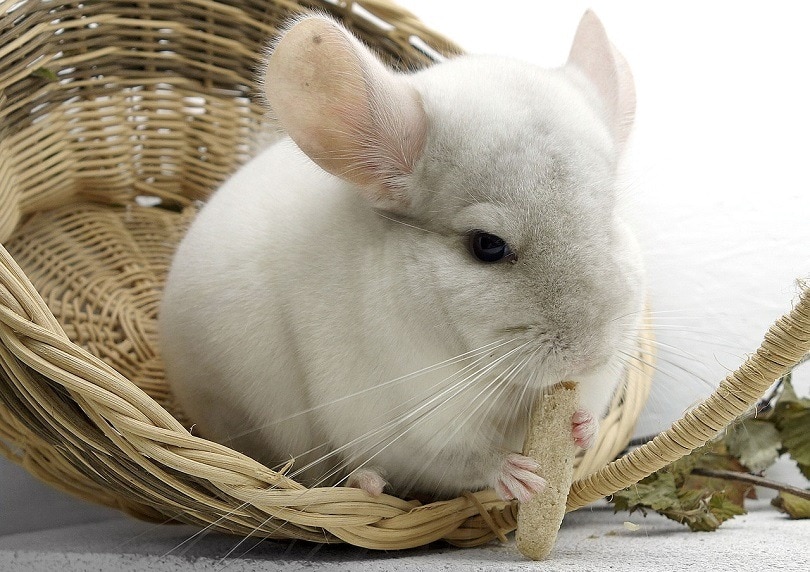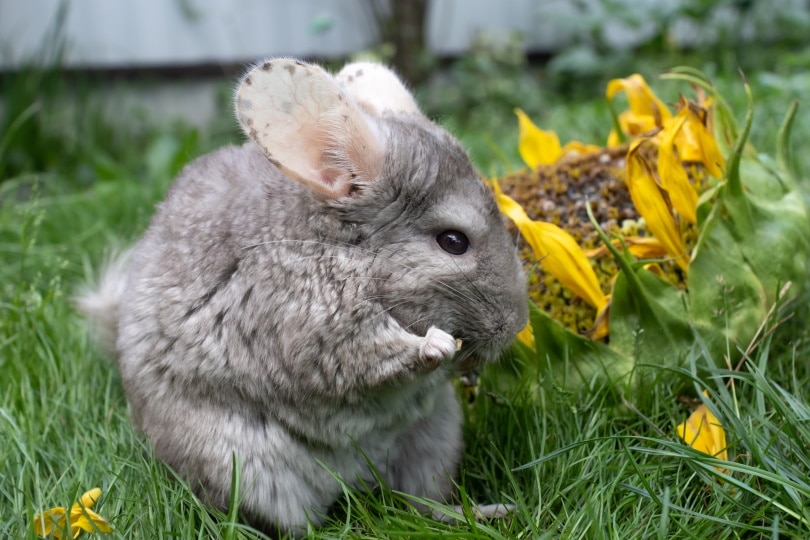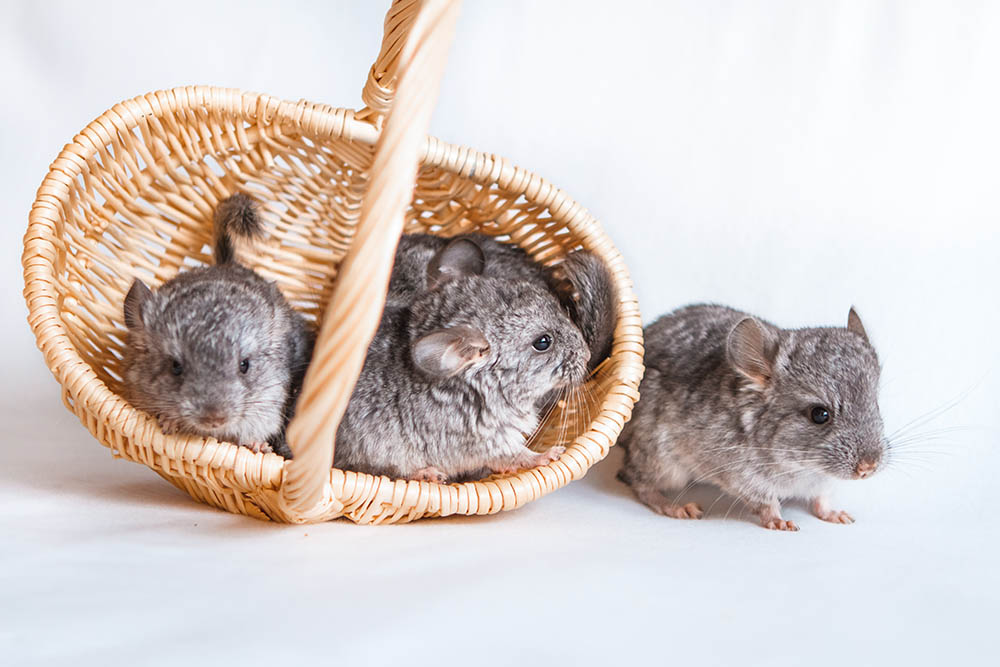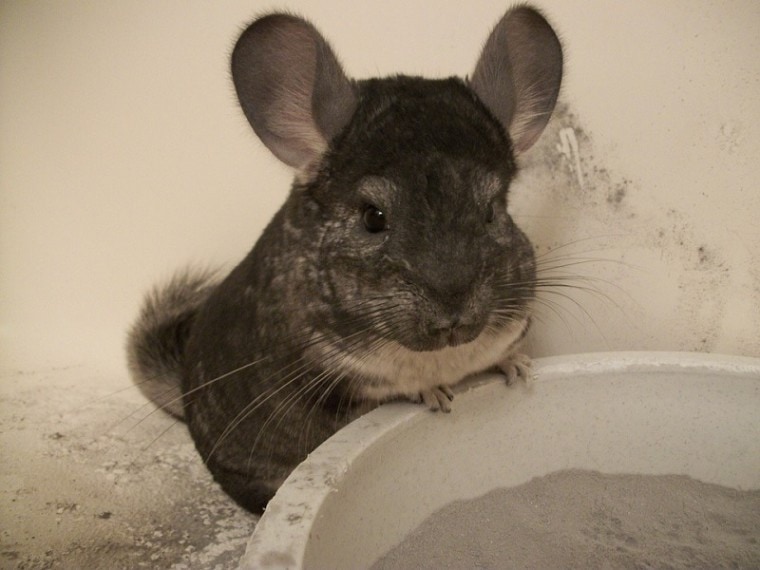
Click to Skip Ahead
Before adopting any animal, you must carefully consider their lifespan. For example, if you adopt a chinchilla, you need to ensure that you can properly care for it for the totality of their lifespan which is 10 to 15 years on average, but with proper care, it may be around 20 years.
Chinchillas have varying lifespans that depend on a variety of different factors. Though you will never be able to tell exactly how long a particular chinchilla will live, you can bet that a well-cared-for animal will live longer than one that is not taken care of properly.
Here, we discuss the average lifespan of a chinchilla and the factors that contribute to their longevity.
 What’s the Average Lifespan of a Chinchilla?
What’s the Average Lifespan of a Chinchilla?
Chinchillas can typically live as long as 10 to 15 years in captivity. The confirmed record for a captive individual is just over 17 years 1. Anecdotal evidence suggests they may exceed the 20-year mark, with one unconfirmed report of a male reaching 22 years of age. It is plausible that they may be able to reach the 15 year mark with appropriate care.
They are somewhat fragile animals, though, so it can be difficult to keep them alive this long unless you are well-educated and provide them with everything that they need .
They are not good pets for first-time pet owners because they don’t tend to be forgiving of mistakes.
Therefore, we only recommend adopting a chinchilla if you are confident that you can take care of them properly and after you’ve done your research on the species.

Why Do Some Chinchillas Live Longer Than Others?
1. Nutrition and Health
Ensuring that your chinchilla eats correctly is essential for taking care of them. Most importantly, chinchillas should have an unlimited amount of hay to snack on as they need to.
This hay provides an essential form of fiber, and it is crucial for grinding down their teeth. If they do not have enough hay (or chew toys), they will not wear them down properly.
While you can use chew toys to help with this matter, hay is truly the best option. It is what they would naturally eat in the wild, so it only makes sense that they should be provided it in captivity too.
Dental issues are common problems for chinchillas and can lead to health complications if not addressed properly.
It is also important to note that their digestive systems are very sensitive to new food items; therefore, new foods should always be introduced slowly.

2. Appropriate Temperature and Humidity
Even though chinchillas are not reptiles, you should still control the temperature and humidity of your chinchilla’s habitat.
Preferably, you should regulate the temperature to a range of between 50 to 60°F (10 to 16°C). Chinchillas can adapt to lower temperatures relatively well but do not handle heat very well. Chinchillas are prone to heat stroke at temperatures greater than 80°F (27°C).
In addition, their environment should be dry, draft-free, and away from direct sunlight.
3. Enclosure
Despite their small size, the high level of activity in chinchillas mandates a relatively large cage.
Activity and exercise will help your chinchilla live longer, and they will be unable to move around much if they are in a small cage. These animals are active and lively. If you provide them with enough room, they should be able to exercise just fine.
Without the proper amount of space to roam, these rodents are prone to obesity and diabetes. Their cage should not have plastic-coated wire, as they can easily chew through such material. The wire itself can be a health risk if they gnaw on it.
4. Healthcare
You should get your chinchilla the proper amount of healthcare. They should get at least one checkup from a veterinarian each year.
Furthermore, you should have contact with a vet whom you can contact in the case of an emergency. Chinchillas are prone to sickness because they are sensitive creatures. Incidents like an inappropriate temperature or the introduction of a new food item can result in a sick pet.
Getting the proper care when your chinchilla is sick is essential to their wellbeing.

The 4 Life Stages of a Chinchilla
1. Kit
Kits are born weighing anywhere from 2 to 2.5 ounces (60 to 70 grams). Almost all litters have two kits, though in some circumstances, one or three kits might be born. They are born with fur and open eyes and can often walk within just an hour after being born. Kits usually stay with their mother for 6 to 8 weeks.

2. Juvenile
Around the 8-week mark, the chinchillas become weanlings. Usually, they are separated from their mother at this point and put into new cages.
Since young chinchillas tend to be extremely active, you should consider housing them in a big enclosure. However, given their small size at this age, you must pay attention to the bar spacing in their enclosure to avoid accidents and injuries.
3. Adult
The onset of sexual maturity signals the beginning of adulthood. This usually happens around the 6 to 8-month mark for most chinchillas. Most of a chinchilla’s life is spent as an adult.
4. Senior
A chinchilla is considered a senior when they can no longer reproduce; however, there isn’t a consensus on when this happens, as individuals that are up to 15 years of age may still be able to reproduce. Generally speaking, the concept of seniority is a term used by humans and may not necessarily apply to chinchillas in a completely physiological sense.
Interestingly, the only well-documented ailments in chinchillas that might be age-related are issues involving the eyes, such as cataracts. Despite living much longer than other rodents, the incidences of tumors in chinchillas is exceptionally rare. Therefore, it is not possible to ascertain when a chinchilla is a senior in a strict sense, as they don’t seem to age with much medical consequences.
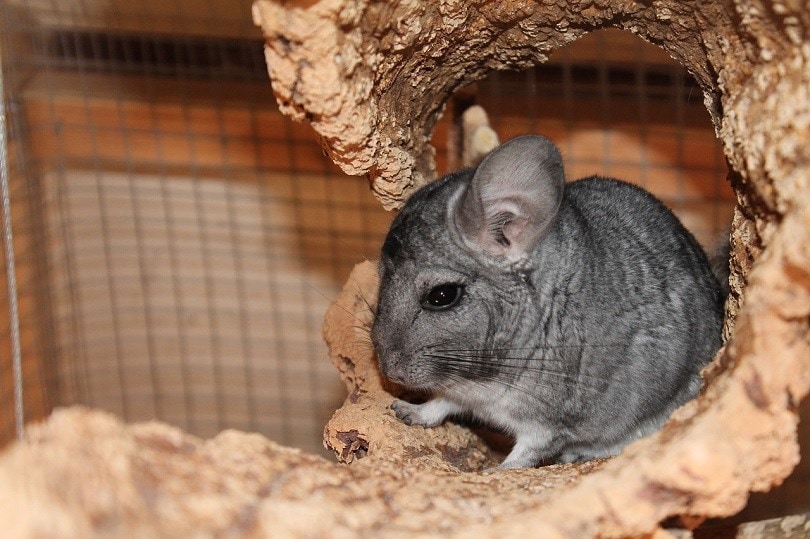
How to Tell Your Chinchilla’s Age
It is extremely difficult to tell their age. In many cases, your best bet is to ask your vet or the breeder or the source of the chinchilla. Your vet may be able to estimate their age, but accurate information requires appropriate documentation about their birth.
 Conclusion
Conclusion
Chinchillas are long-lived rodents, averaging a lifespan of around 10 to 15 years, with some unconfirmed but plausible claims of certain individuals surpassing the 20-year threshold. Many factors determine a chinchilla’s lifespan, and therefore, there’s no way to know for sure how long your pet will live when you adopt them. Nonetheless, you can ensure that your pet lives their best life by ensuring that their needs are met.
- Related article: Do Chinchillas Smell?
Featured Image Credit: AmberRVT, Pixabay

 What’s the Average Lifespan of a Chinchilla?
What’s the Average Lifespan of a Chinchilla?